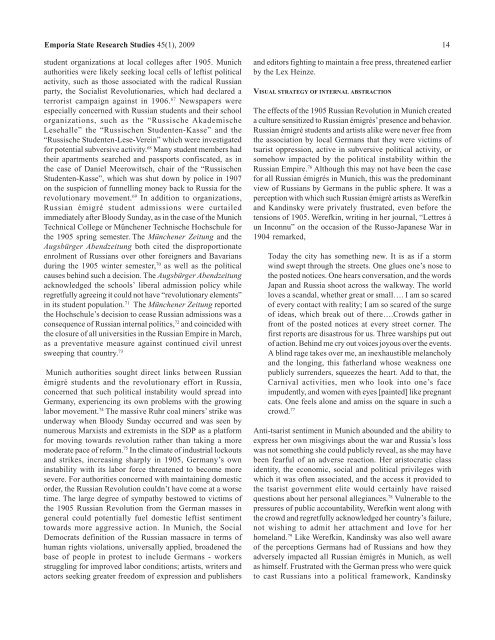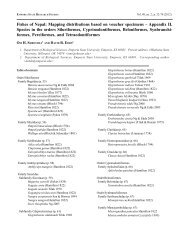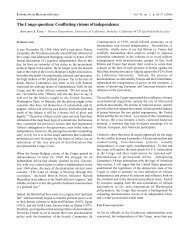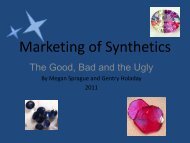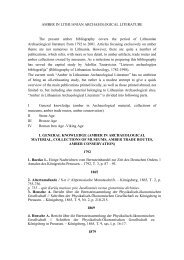Russian émigré artists and political opposition in fin-de-siècle Munich
Russian émigré artists and political opposition in fin-de-siècle Munich
Russian émigré artists and political opposition in fin-de-siècle Munich
- No tags were found...
Create successful ePaper yourself
Turn your PDF publications into a flip-book with our unique Google optimized e-Paper software.
Emporia State Research Studies 45(1), 2009 14stu<strong>de</strong>nt organizations at local colleges after 1905. <strong>Munich</strong>authorities were likely seek<strong>in</strong>g local cells of leftist <strong>political</strong>activity, such as those associated with the radical <strong>Russian</strong>party, the Socialist Revolutionaries, which had <strong>de</strong>clared aterrorist campaign aga<strong>in</strong>st <strong>in</strong> 1906. 67 Newspapers wereespecially concerned with <strong>Russian</strong> stu<strong>de</strong>nts <strong>and</strong> their schoolorganizations, such as the “Russische Aka<strong>de</strong>mischeLesehalle” the “Russischen Stu<strong>de</strong>nten-Kasse” <strong>and</strong> the“Russische Stu<strong>de</strong>nten-Lese-Vere<strong>in</strong>” which were <strong>in</strong>vestigatedfor potential subversive activity. 68 Many stu<strong>de</strong>nt members hadtheir apartments searched <strong>and</strong> passports confiscated, as <strong>in</strong>the case of Daniel Meerowitsch, chair of the “RussischenStu<strong>de</strong>nten-Kasse”, which was shut down by police <strong>in</strong> 1907on the suspicion of funnell<strong>in</strong>g money back to Russia for therevolutionary movement. 69 In addition to organizations,<strong>Russian</strong> <strong>émigré</strong> stu<strong>de</strong>nt admissions were curtailedimmediately after Bloody Sunday, as <strong>in</strong> the case of the <strong>Munich</strong>Technical College or Münchener Technische Hochschule forthe 1905 spr<strong>in</strong>g semester. The Münchener Zeitung <strong>and</strong> theAugsbürger Abendzeitung both cited the disproportionateenrolment of <strong>Russian</strong>s over other foreigners <strong>and</strong> Bavariansdur<strong>in</strong>g the 1905 w<strong>in</strong>ter semester, 70 as well as the <strong>political</strong>causes beh<strong>in</strong>d such a <strong>de</strong>cision. The Augsbürger Abendzeitungacknowledged the schools’ liberal admission policy whileregretfully agree<strong>in</strong>g it could not have “revolutionary elements”<strong>in</strong> its stu<strong>de</strong>nt population. 71 The Münchener Zeitung reportedthe Hochschule’s <strong>de</strong>cision to cease <strong>Russian</strong> admissions was aconsequence of <strong>Russian</strong> <strong>in</strong>ternal politics, 72 <strong>and</strong> co<strong>in</strong>ci<strong>de</strong>d withthe closure of all universities <strong>in</strong> the <strong>Russian</strong> Empire <strong>in</strong> March,as a preventative measure aga<strong>in</strong>st cont<strong>in</strong>ued civil unrestsweep<strong>in</strong>g that country. 73<strong>Munich</strong> authorities sought direct l<strong>in</strong>ks between <strong>Russian</strong><strong>émigré</strong> stu<strong>de</strong>nts <strong>and</strong> the revolutionary effort <strong>in</strong> Russia,concerned that such <strong>political</strong> <strong>in</strong>stability would spread <strong>in</strong>toGermany, experienc<strong>in</strong>g its own problems with the grow<strong>in</strong>glabor movement. 74 The massive Ruhr coal m<strong>in</strong>ers’ strike wasun<strong>de</strong>rway when Bloody Sunday occurred <strong>and</strong> was seen bynumerous Marxists <strong>and</strong> extremists <strong>in</strong> the SDP as a platformfor mov<strong>in</strong>g towards revolution rather than tak<strong>in</strong>g a moremo<strong>de</strong>rate pace of reform. 75 In the climate of <strong>in</strong>dustrial lockouts<strong>and</strong> strikes, <strong>in</strong>creas<strong>in</strong>g sharply <strong>in</strong> 1905, Germany’s own<strong>in</strong>stability with its labor force threatened to become moresevere. For authorities concerned with ma<strong>in</strong>ta<strong>in</strong><strong>in</strong>g domesticor<strong>de</strong>r, the <strong>Russian</strong> Revolution couldn’t have come at a worsetime. The large <strong>de</strong>gree of sympathy bestowed to victims ofthe 1905 <strong>Russian</strong> Revolution from the German masses <strong>in</strong>general could potentially fuel domestic leftist sentimenttowards more aggressive action. In <strong>Munich</strong>, the SocialDemocrats <strong>de</strong>f<strong>in</strong>ition of the <strong>Russian</strong> massacre <strong>in</strong> terms ofhuman rights violations, universally applied, broa<strong>de</strong>ned thebase of people <strong>in</strong> protest to <strong>in</strong>clu<strong>de</strong> Germans - workersstruggl<strong>in</strong>g for improved labor conditions; <strong>artists</strong>, writers <strong>and</strong>actors seek<strong>in</strong>g greater freedom of expression <strong>and</strong> publishers<strong>and</strong> editors fight<strong>in</strong>g to ma<strong>in</strong>ta<strong>in</strong> a free press, threatened earlierby the Lex He<strong>in</strong>ze.VISUAL STRATEGY OF INTERNAL ABSTRACTIONThe effects of the 1905 <strong>Russian</strong> Revolution <strong>in</strong> <strong>Munich</strong> createda culture sensitized to <strong>Russian</strong> <strong>émigré</strong>s’ presence <strong>and</strong> behavior.<strong>Russian</strong> <strong>émigré</strong> stu<strong>de</strong>nts <strong>and</strong> <strong>artists</strong> alike were never free fromthe association by local Germans that they were victims oftsarist oppression, active <strong>in</strong> subversive <strong>political</strong> activity, orsomehow impacted by the <strong>political</strong> <strong>in</strong>stability with<strong>in</strong> the<strong>Russian</strong> Empire. 76 Although this may not have been the casefor all <strong>Russian</strong> <strong>émigré</strong>s <strong>in</strong> <strong>Munich</strong>, this was the predom<strong>in</strong>antview of <strong>Russian</strong>s by Germans <strong>in</strong> the public sphere. It was aperception with which such <strong>Russian</strong> <strong>émigré</strong> <strong>artists</strong> as Werefk<strong>in</strong><strong>and</strong> K<strong>and</strong><strong>in</strong>sky were privately frustrated, even before thetensions of 1905. Werefk<strong>in</strong>, writ<strong>in</strong>g <strong>in</strong> her journal, “Lettres áun Inconnu” on the occasion of the Russo-Japanese War <strong>in</strong>1904 remarked,Today the city has someth<strong>in</strong>g new. It is as if a stormw<strong>in</strong>d swept through the streets. One glues one’s nose tothe posted notices. One hears conversation, <strong>and</strong> the wordsJapan <strong>and</strong> Russia shoot across the walkway. The worldloves a sc<strong>and</strong>al, whether great or small…. I am so scaredof every contact with reality; I am so scared of the surgeof i<strong>de</strong>as, which break out of there….Crowds gather <strong>in</strong>front of the posted notices at every street corner. Thefirst reports are disastrous for us. Three warships put outof action. Beh<strong>in</strong>d me cry out voices joyous over the events.A bl<strong>in</strong>d rage takes over me, an <strong>in</strong>exhaustible melancholy<strong>and</strong> the long<strong>in</strong>g, this fatherl<strong>and</strong> whose weakness onepublicly surren<strong>de</strong>rs, squeezes the heart. Add to that, theCarnival activities, men who look <strong>in</strong>to one’s faceimpu<strong>de</strong>ntly, <strong>and</strong> women with eyes [pa<strong>in</strong>ted] like pregnantcats. One feels alone <strong>and</strong> amiss on the square <strong>in</strong> such acrowd. 77Anti-tsarist sentiment <strong>in</strong> <strong>Munich</strong> aboun<strong>de</strong>d <strong>and</strong> the ability toexpress her own misgiv<strong>in</strong>gs about the war <strong>and</strong> Russia’s losswas not someth<strong>in</strong>g she could publicly reveal, as she may havebeen fearful of an adverse reaction. Her aristocratic classi<strong>de</strong>ntity, the economic, social <strong>and</strong> <strong>political</strong> privileges withwhich it was often associated, <strong>and</strong> the access it provi<strong>de</strong>d tothe tsarist government elite would certa<strong>in</strong>ly have raisedquestions about her personal allegiances. 78 Vulnerable to thepressures of public accountability, Werefk<strong>in</strong> went along withthe crowd <strong>and</strong> regretfully acknowledged her country’s failure,not wish<strong>in</strong>g to admit her attachment <strong>and</strong> love for herhomel<strong>and</strong>. 79 Like Werefk<strong>in</strong>, K<strong>and</strong><strong>in</strong>sky was also well awareof the perceptions Germans had of <strong>Russian</strong>s <strong>and</strong> how theyadversely impacted all <strong>Russian</strong> <strong>émigré</strong>s <strong>in</strong> <strong>Munich</strong>, as wellas himself. Frustrated with the German press who were quickto cast <strong>Russian</strong>s <strong>in</strong>to a <strong>political</strong> framework, K<strong>and</strong><strong>in</strong>sky


